Comprehensive CDIOD Analysis of Facebook: Design, Limitations & Future
VerifiedAdded on 2023/06/09
|15
|4157
|198
Report
AI Summary
This report provides a comprehensive analysis of Facebook through the lens of the Conceive, Design, Implement, Operate, and Dismantle (CDIOD) framework. It delves into the history and invention of Facebook by Mark Zuckerberg, its initial purpose of connecting college students, and its evolution into a global social networking platform. The report examines the motives behind its creation, including facilitating interaction, sharing information, ensuring privacy, and establishing a successful business. While Facebook has achieved significant success in connecting people worldwide, the analysis also highlights its limitations and drawbacks, such as addiction, fake profiles, account hacking, and privacy concerns. Alternative ideas and specifications for a more user-centric social medium are considered, and the report concludes with recommendations for improving Facebook's design and functionality. Desklib offers this assignment solution and many more resources for students.
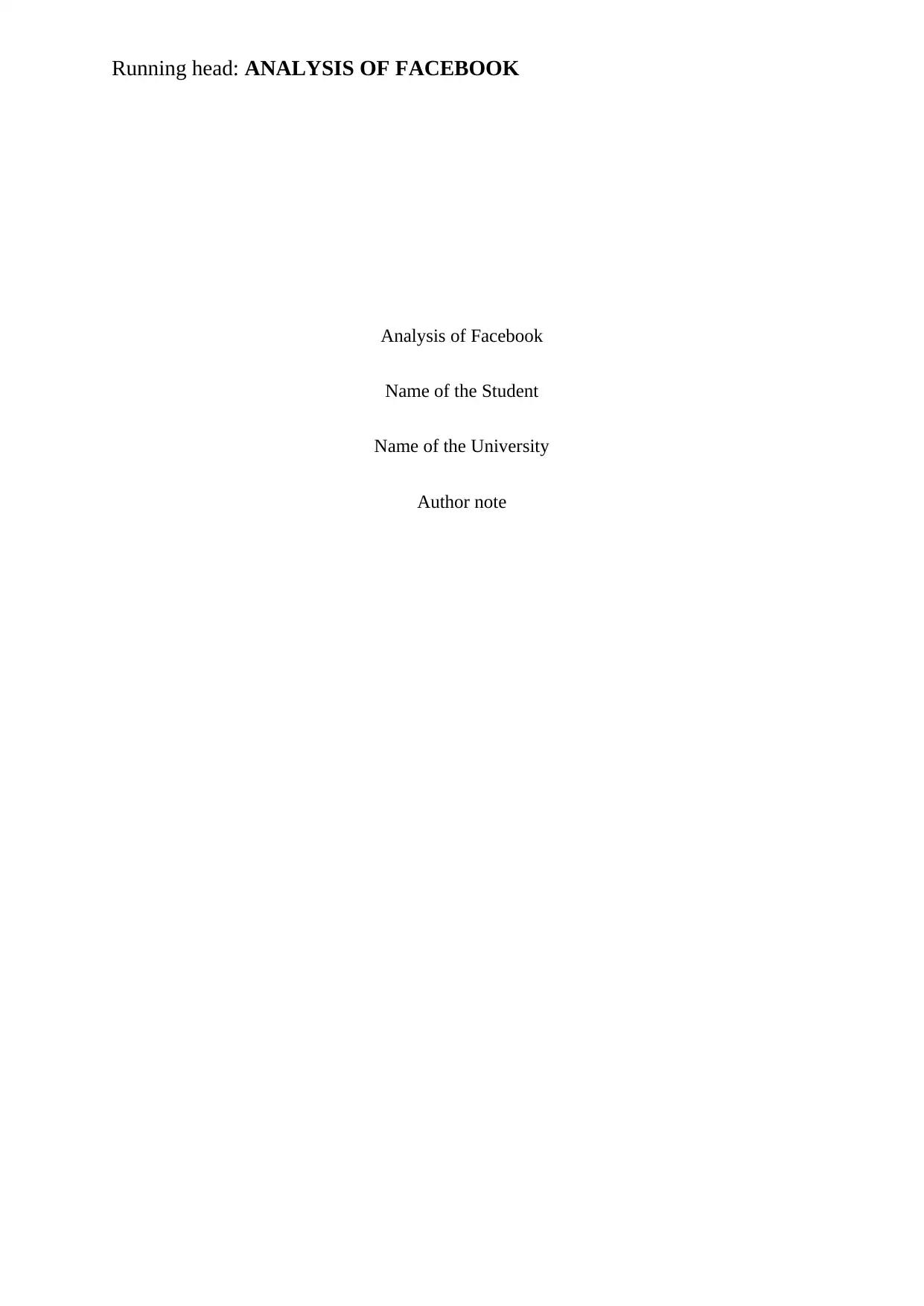
Running head: ANALYSIS OF FACEBOOK
Analysis of Facebook
Name of the Student
Name of the University
Author note
Analysis of Facebook
Name of the Student
Name of the University
Author note
Paraphrase This Document
Need a fresh take? Get an instant paraphrase of this document with our AI Paraphraser
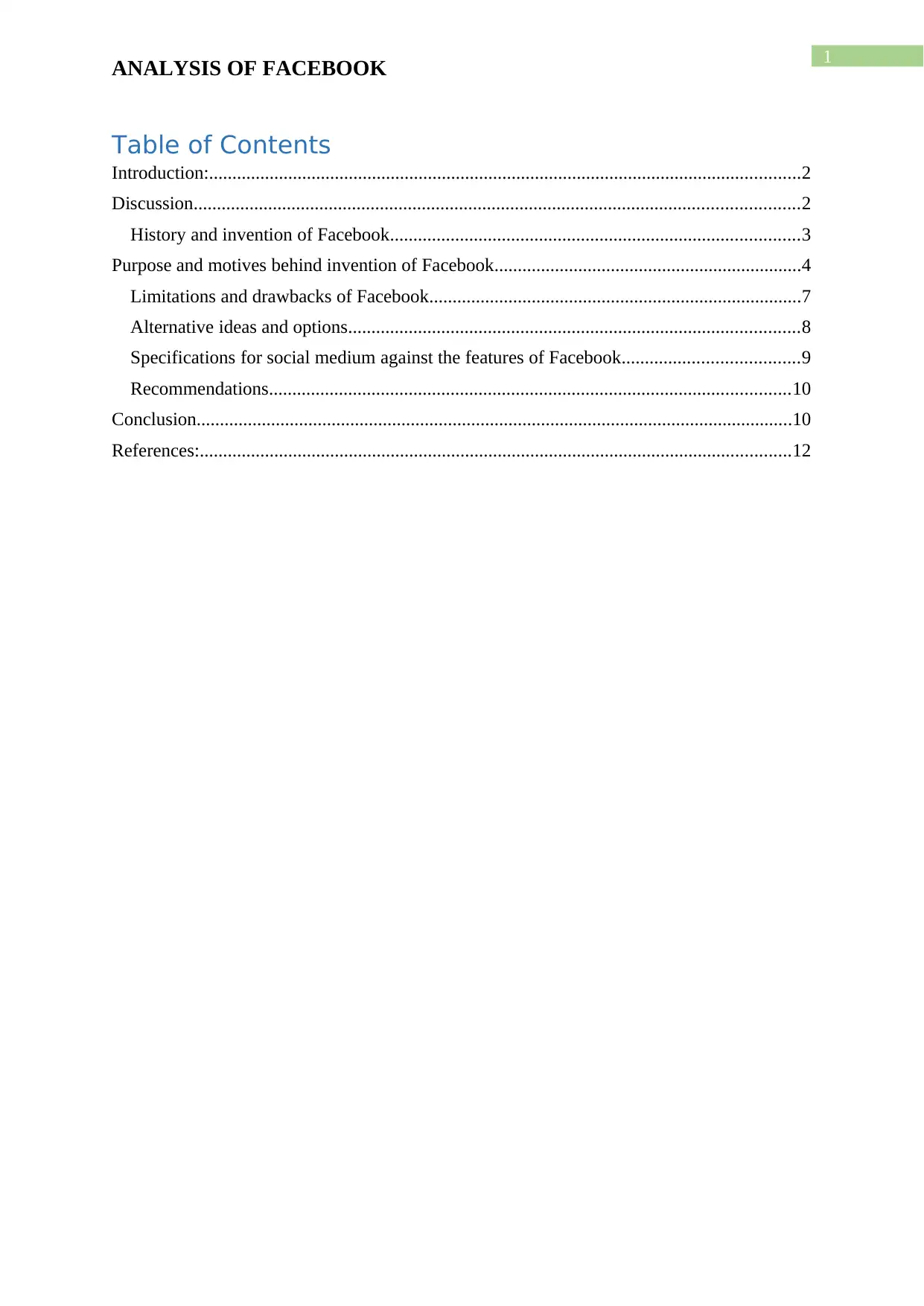
1
ANALYSIS OF FACEBOOK
Table of Contents
Introduction:...............................................................................................................................2
Discussion..................................................................................................................................2
History and invention of Facebook........................................................................................3
Purpose and motives behind invention of Facebook..................................................................4
Limitations and drawbacks of Facebook................................................................................7
Alternative ideas and options.................................................................................................8
Specifications for social medium against the features of Facebook......................................9
Recommendations................................................................................................................10
Conclusion................................................................................................................................10
References:...............................................................................................................................12
ANALYSIS OF FACEBOOK
Table of Contents
Introduction:...............................................................................................................................2
Discussion..................................................................................................................................2
History and invention of Facebook........................................................................................3
Purpose and motives behind invention of Facebook..................................................................4
Limitations and drawbacks of Facebook................................................................................7
Alternative ideas and options.................................................................................................8
Specifications for social medium against the features of Facebook......................................9
Recommendations................................................................................................................10
Conclusion................................................................................................................................10
References:...............................................................................................................................12
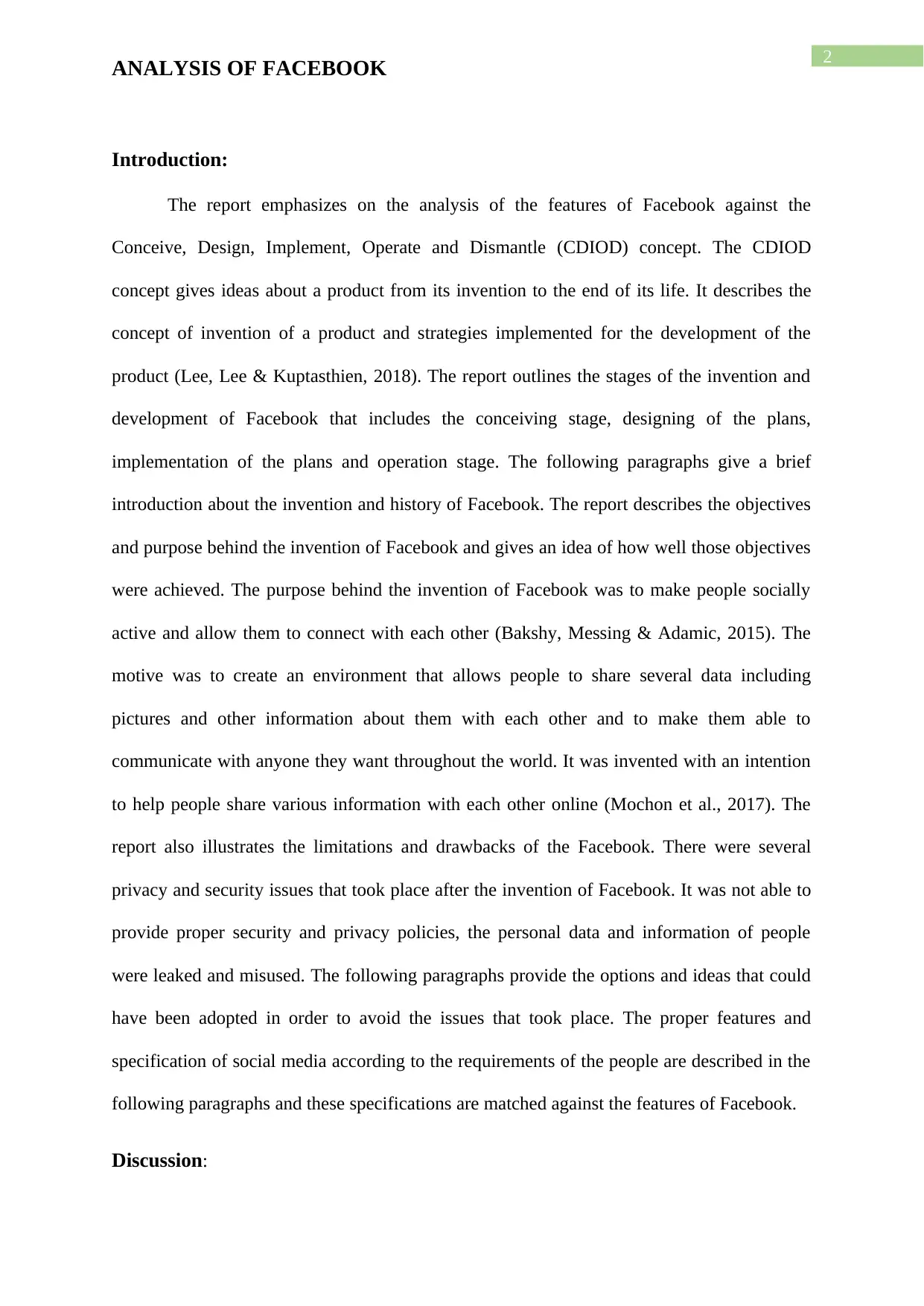
2
ANALYSIS OF FACEBOOK
Introduction:
The report emphasizes on the analysis of the features of Facebook against the
Conceive, Design, Implement, Operate and Dismantle (CDIOD) concept. The CDIOD
concept gives ideas about a product from its invention to the end of its life. It describes the
concept of invention of a product and strategies implemented for the development of the
product (Lee, Lee & Kuptasthien, 2018). The report outlines the stages of the invention and
development of Facebook that includes the conceiving stage, designing of the plans,
implementation of the plans and operation stage. The following paragraphs give a brief
introduction about the invention and history of Facebook. The report describes the objectives
and purpose behind the invention of Facebook and gives an idea of how well those objectives
were achieved. The purpose behind the invention of Facebook was to make people socially
active and allow them to connect with each other (Bakshy, Messing & Adamic, 2015). The
motive was to create an environment that allows people to share several data including
pictures and other information about them with each other and to make them able to
communicate with anyone they want throughout the world. It was invented with an intention
to help people share various information with each other online (Mochon et al., 2017). The
report also illustrates the limitations and drawbacks of the Facebook. There were several
privacy and security issues that took place after the invention of Facebook. It was not able to
provide proper security and privacy policies, the personal data and information of people
were leaked and misused. The following paragraphs provide the options and ideas that could
have been adopted in order to avoid the issues that took place. The proper features and
specification of social media according to the requirements of the people are described in the
following paragraphs and these specifications are matched against the features of Facebook.
Discussion:
ANALYSIS OF FACEBOOK
Introduction:
The report emphasizes on the analysis of the features of Facebook against the
Conceive, Design, Implement, Operate and Dismantle (CDIOD) concept. The CDIOD
concept gives ideas about a product from its invention to the end of its life. It describes the
concept of invention of a product and strategies implemented for the development of the
product (Lee, Lee & Kuptasthien, 2018). The report outlines the stages of the invention and
development of Facebook that includes the conceiving stage, designing of the plans,
implementation of the plans and operation stage. The following paragraphs give a brief
introduction about the invention and history of Facebook. The report describes the objectives
and purpose behind the invention of Facebook and gives an idea of how well those objectives
were achieved. The purpose behind the invention of Facebook was to make people socially
active and allow them to connect with each other (Bakshy, Messing & Adamic, 2015). The
motive was to create an environment that allows people to share several data including
pictures and other information about them with each other and to make them able to
communicate with anyone they want throughout the world. It was invented with an intention
to help people share various information with each other online (Mochon et al., 2017). The
report also illustrates the limitations and drawbacks of the Facebook. There were several
privacy and security issues that took place after the invention of Facebook. It was not able to
provide proper security and privacy policies, the personal data and information of people
were leaked and misused. The following paragraphs provide the options and ideas that could
have been adopted in order to avoid the issues that took place. The proper features and
specification of social media according to the requirements of the people are described in the
following paragraphs and these specifications are matched against the features of Facebook.
Discussion:
⊘ This is a preview!⊘
Do you want full access?
Subscribe today to unlock all pages.

Trusted by 1+ million students worldwide
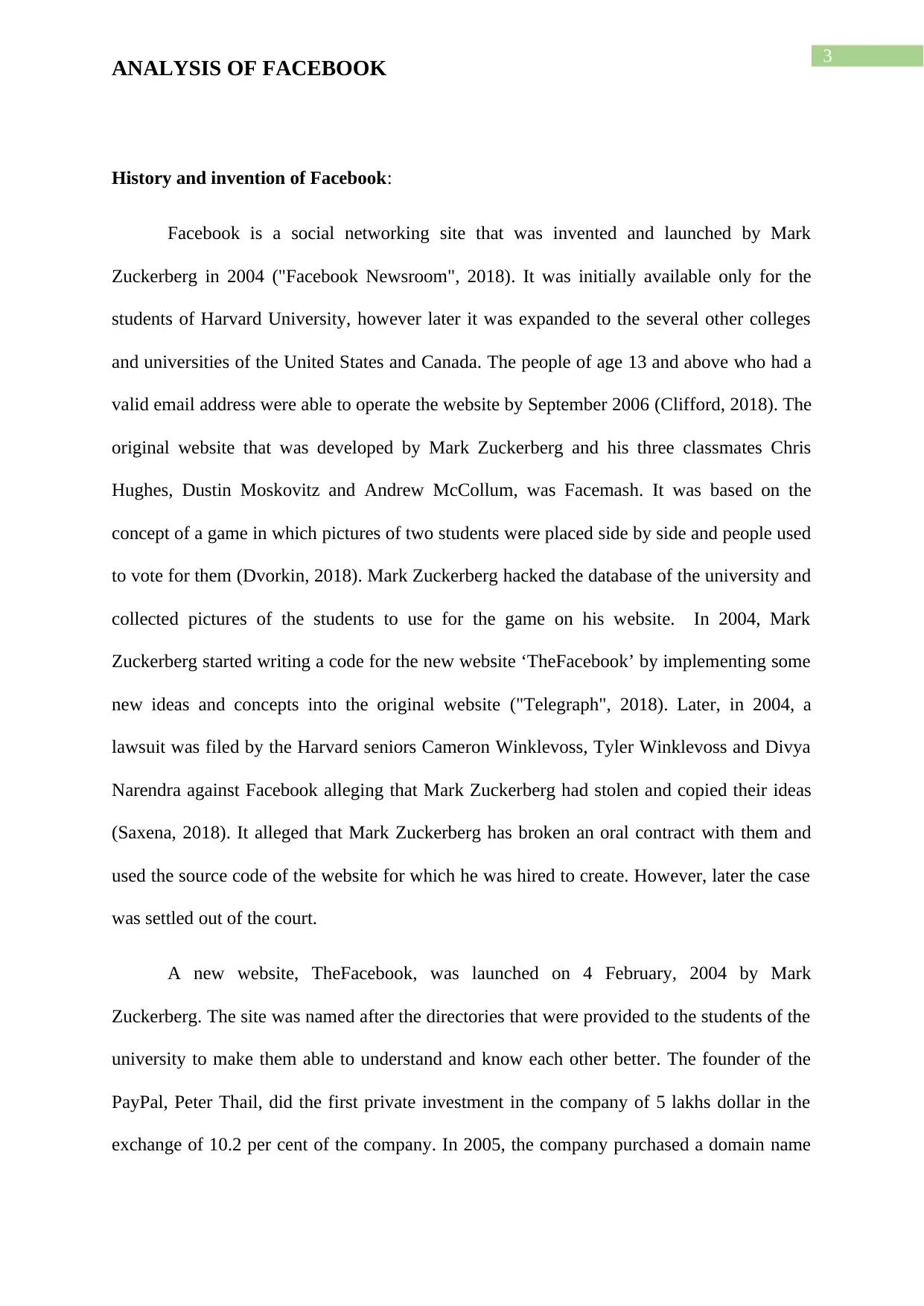
3
ANALYSIS OF FACEBOOK
History and invention of Facebook:
Facebook is a social networking site that was invented and launched by Mark
Zuckerberg in 2004 ("Facebook Newsroom", 2018). It was initially available only for the
students of Harvard University, however later it was expanded to the several other colleges
and universities of the United States and Canada. The people of age 13 and above who had a
valid email address were able to operate the website by September 2006 (Clifford, 2018). The
original website that was developed by Mark Zuckerberg and his three classmates Chris
Hughes, Dustin Moskovitz and Andrew McCollum, was Facemash. It was based on the
concept of a game in which pictures of two students were placed side by side and people used
to vote for them (Dvorkin, 2018). Mark Zuckerberg hacked the database of the university and
collected pictures of the students to use for the game on his website. In 2004, Mark
Zuckerberg started writing a code for the new website ‘TheFacebook’ by implementing some
new ideas and concepts into the original website ("Telegraph", 2018). Later, in 2004, a
lawsuit was filed by the Harvard seniors Cameron Winklevoss, Tyler Winklevoss and Divya
Narendra against Facebook alleging that Mark Zuckerberg had stolen and copied their ideas
(Saxena, 2018). It alleged that Mark Zuckerberg has broken an oral contract with them and
used the source code of the website for which he was hired to create. However, later the case
was settled out of the court.
A new website, TheFacebook, was launched on 4 February, 2004 by Mark
Zuckerberg. The site was named after the directories that were provided to the students of the
university to make them able to understand and know each other better. The founder of the
PayPal, Peter Thail, did the first private investment in the company of 5 lakhs dollar in the
exchange of 10.2 per cent of the company. In 2005, the company purchased a domain name
ANALYSIS OF FACEBOOK
History and invention of Facebook:
Facebook is a social networking site that was invented and launched by Mark
Zuckerberg in 2004 ("Facebook Newsroom", 2018). It was initially available only for the
students of Harvard University, however later it was expanded to the several other colleges
and universities of the United States and Canada. The people of age 13 and above who had a
valid email address were able to operate the website by September 2006 (Clifford, 2018). The
original website that was developed by Mark Zuckerberg and his three classmates Chris
Hughes, Dustin Moskovitz and Andrew McCollum, was Facemash. It was based on the
concept of a game in which pictures of two students were placed side by side and people used
to vote for them (Dvorkin, 2018). Mark Zuckerberg hacked the database of the university and
collected pictures of the students to use for the game on his website. In 2004, Mark
Zuckerberg started writing a code for the new website ‘TheFacebook’ by implementing some
new ideas and concepts into the original website ("Telegraph", 2018). Later, in 2004, a
lawsuit was filed by the Harvard seniors Cameron Winklevoss, Tyler Winklevoss and Divya
Narendra against Facebook alleging that Mark Zuckerberg had stolen and copied their ideas
(Saxena, 2018). It alleged that Mark Zuckerberg has broken an oral contract with them and
used the source code of the website for which he was hired to create. However, later the case
was settled out of the court.
A new website, TheFacebook, was launched on 4 February, 2004 by Mark
Zuckerberg. The site was named after the directories that were provided to the students of the
university to make them able to understand and know each other better. The founder of the
PayPal, Peter Thail, did the first private investment in the company of 5 lakhs dollar in the
exchange of 10.2 per cent of the company. In 2005, the company purchased a domain name
Paraphrase This Document
Need a fresh take? Get an instant paraphrase of this document with our AI Paraphraser
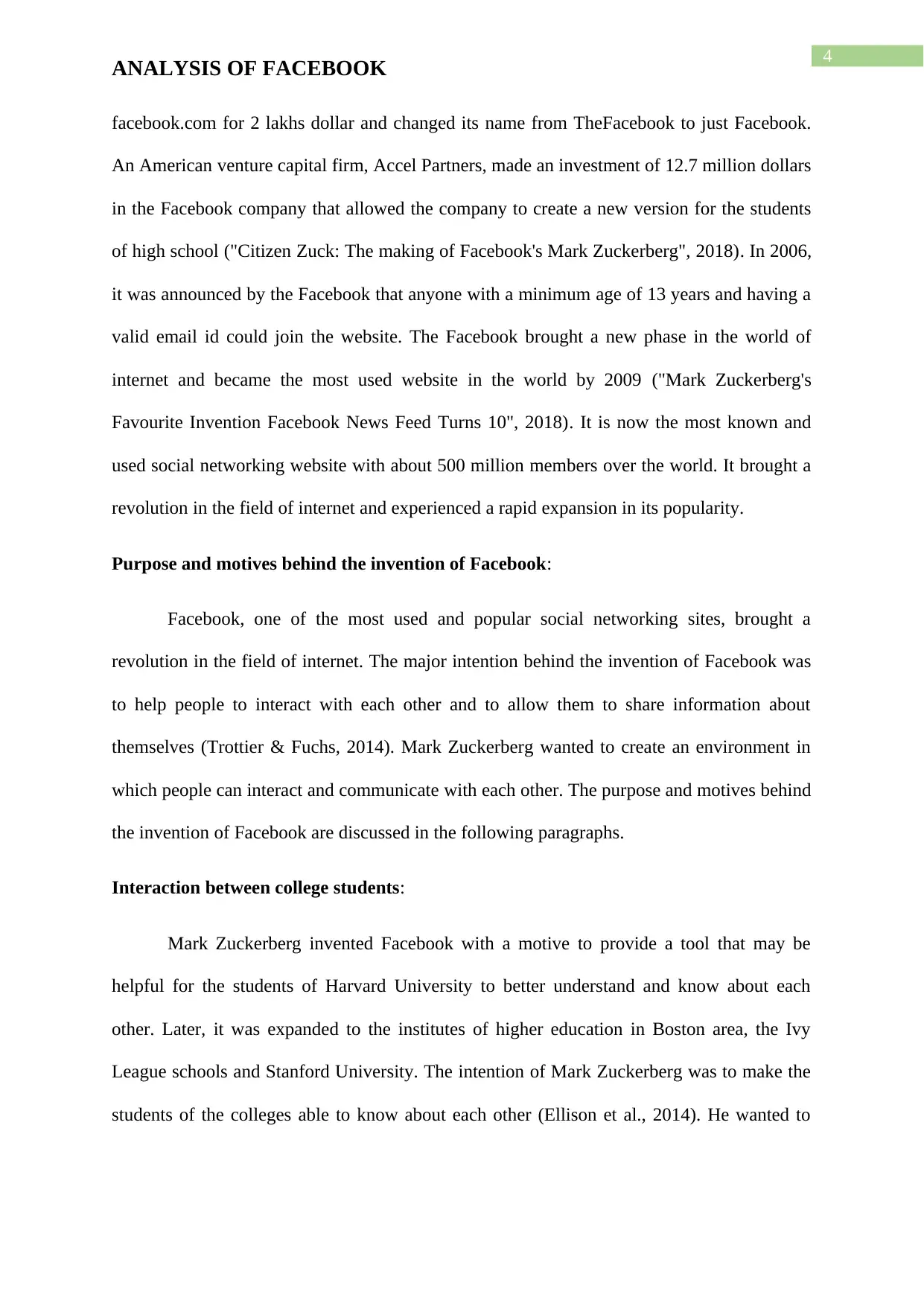
4
ANALYSIS OF FACEBOOK
facebook.com for 2 lakhs dollar and changed its name from TheFacebook to just Facebook.
An American venture capital firm, Accel Partners, made an investment of 12.7 million dollars
in the Facebook company that allowed the company to create a new version for the students
of high school ("Citizen Zuck: The making of Facebook's Mark Zuckerberg", 2018). In 2006,
it was announced by the Facebook that anyone with a minimum age of 13 years and having a
valid email id could join the website. The Facebook brought a new phase in the world of
internet and became the most used website in the world by 2009 ("Mark Zuckerberg's
Favourite Invention Facebook News Feed Turns 10", 2018). It is now the most known and
used social networking website with about 500 million members over the world. It brought a
revolution in the field of internet and experienced a rapid expansion in its popularity.
Purpose and motives behind the invention of Facebook:
Facebook, one of the most used and popular social networking sites, brought a
revolution in the field of internet. The major intention behind the invention of Facebook was
to help people to interact with each other and to allow them to share information about
themselves (Trottier & Fuchs, 2014). Mark Zuckerberg wanted to create an environment in
which people can interact and communicate with each other. The purpose and motives behind
the invention of Facebook are discussed in the following paragraphs.
Interaction between college students:
Mark Zuckerberg invented Facebook with a motive to provide a tool that may be
helpful for the students of Harvard University to better understand and know about each
other. Later, it was expanded to the institutes of higher education in Boston area, the Ivy
League schools and Stanford University. The intention of Mark Zuckerberg was to make the
students of the colleges able to know about each other (Ellison et al., 2014). He wanted to
ANALYSIS OF FACEBOOK
facebook.com for 2 lakhs dollar and changed its name from TheFacebook to just Facebook.
An American venture capital firm, Accel Partners, made an investment of 12.7 million dollars
in the Facebook company that allowed the company to create a new version for the students
of high school ("Citizen Zuck: The making of Facebook's Mark Zuckerberg", 2018). In 2006,
it was announced by the Facebook that anyone with a minimum age of 13 years and having a
valid email id could join the website. The Facebook brought a new phase in the world of
internet and became the most used website in the world by 2009 ("Mark Zuckerberg's
Favourite Invention Facebook News Feed Turns 10", 2018). It is now the most known and
used social networking website with about 500 million members over the world. It brought a
revolution in the field of internet and experienced a rapid expansion in its popularity.
Purpose and motives behind the invention of Facebook:
Facebook, one of the most used and popular social networking sites, brought a
revolution in the field of internet. The major intention behind the invention of Facebook was
to help people to interact with each other and to allow them to share information about
themselves (Trottier & Fuchs, 2014). Mark Zuckerberg wanted to create an environment in
which people can interact and communicate with each other. The purpose and motives behind
the invention of Facebook are discussed in the following paragraphs.
Interaction between college students:
Mark Zuckerberg invented Facebook with a motive to provide a tool that may be
helpful for the students of Harvard University to better understand and know about each
other. Later, it was expanded to the institutes of higher education in Boston area, the Ivy
League schools and Stanford University. The intention of Mark Zuckerberg was to make the
students of the colleges able to know about each other (Ellison et al., 2014). He wanted to
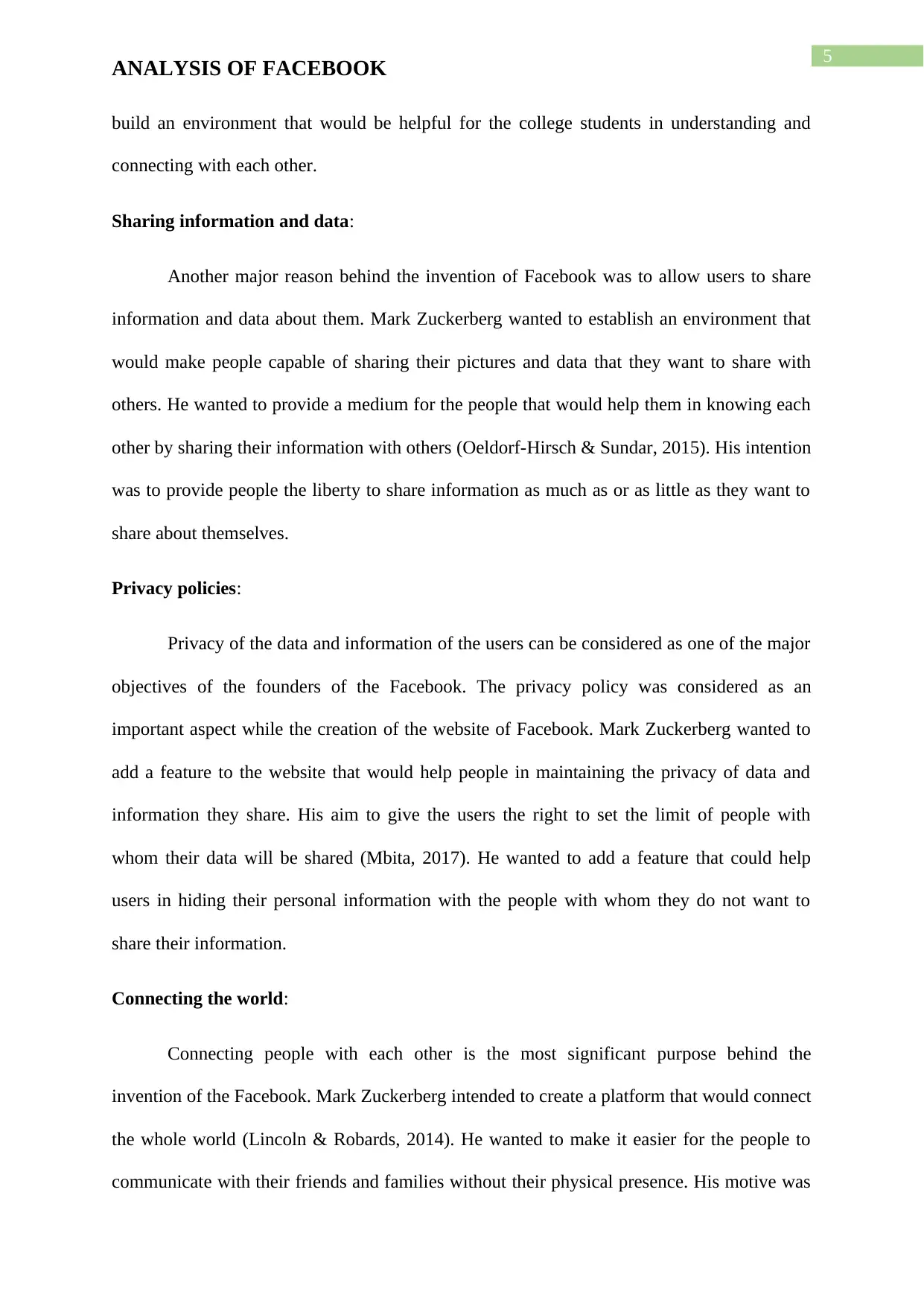
5
ANALYSIS OF FACEBOOK
build an environment that would be helpful for the college students in understanding and
connecting with each other.
Sharing information and data:
Another major reason behind the invention of Facebook was to allow users to share
information and data about them. Mark Zuckerberg wanted to establish an environment that
would make people capable of sharing their pictures and data that they want to share with
others. He wanted to provide a medium for the people that would help them in knowing each
other by sharing their information with others (Oeldorf-Hirsch & Sundar, 2015). His intention
was to provide people the liberty to share information as much as or as little as they want to
share about themselves.
Privacy policies:
Privacy of the data and information of the users can be considered as one of the major
objectives of the founders of the Facebook. The privacy policy was considered as an
important aspect while the creation of the website of Facebook. Mark Zuckerberg wanted to
add a feature to the website that would help people in maintaining the privacy of data and
information they share. His aim to give the users the right to set the limit of people with
whom their data will be shared (Mbita, 2017). He wanted to add a feature that could help
users in hiding their personal information with the people with whom they do not want to
share their information.
Connecting the world:
Connecting people with each other is the most significant purpose behind the
invention of the Facebook. Mark Zuckerberg intended to create a platform that would connect
the whole world (Lincoln & Robards, 2014). He wanted to make it easier for the people to
communicate with their friends and families without their physical presence. His motive was
ANALYSIS OF FACEBOOK
build an environment that would be helpful for the college students in understanding and
connecting with each other.
Sharing information and data:
Another major reason behind the invention of Facebook was to allow users to share
information and data about them. Mark Zuckerberg wanted to establish an environment that
would make people capable of sharing their pictures and data that they want to share with
others. He wanted to provide a medium for the people that would help them in knowing each
other by sharing their information with others (Oeldorf-Hirsch & Sundar, 2015). His intention
was to provide people the liberty to share information as much as or as little as they want to
share about themselves.
Privacy policies:
Privacy of the data and information of the users can be considered as one of the major
objectives of the founders of the Facebook. The privacy policy was considered as an
important aspect while the creation of the website of Facebook. Mark Zuckerberg wanted to
add a feature to the website that would help people in maintaining the privacy of data and
information they share. His aim to give the users the right to set the limit of people with
whom their data will be shared (Mbita, 2017). He wanted to add a feature that could help
users in hiding their personal information with the people with whom they do not want to
share their information.
Connecting the world:
Connecting people with each other is the most significant purpose behind the
invention of the Facebook. Mark Zuckerberg intended to create a platform that would connect
the whole world (Lincoln & Robards, 2014). He wanted to make it easier for the people to
communicate with their friends and families without their physical presence. His motive was
⊘ This is a preview!⊘
Do you want full access?
Subscribe today to unlock all pages.

Trusted by 1+ million students worldwide
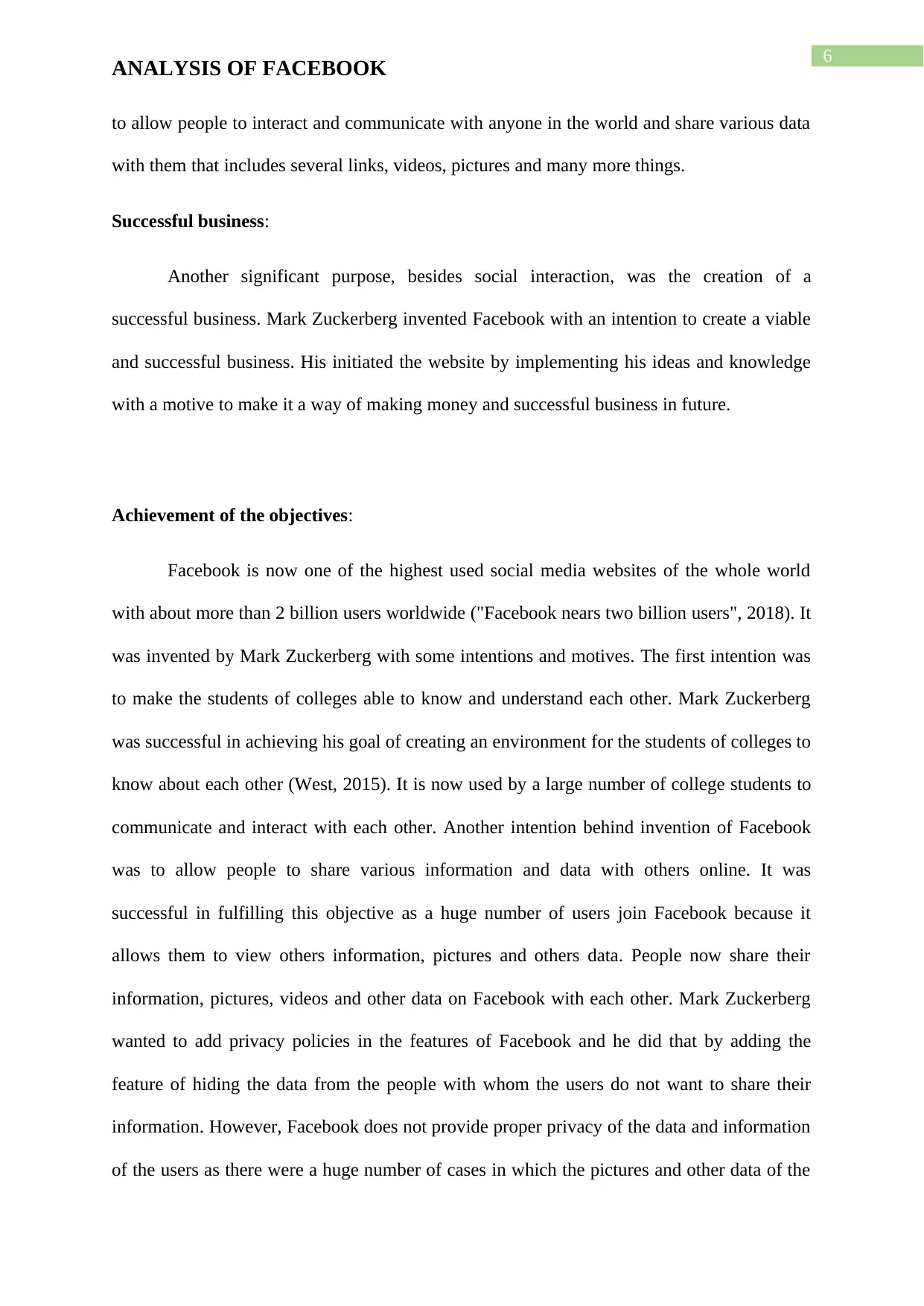
6
ANALYSIS OF FACEBOOK
to allow people to interact and communicate with anyone in the world and share various data
with them that includes several links, videos, pictures and many more things.
Successful business:
Another significant purpose, besides social interaction, was the creation of a
successful business. Mark Zuckerberg invented Facebook with an intention to create a viable
and successful business. His initiated the website by implementing his ideas and knowledge
with a motive to make it a way of making money and successful business in future.
Achievement of the objectives:
Facebook is now one of the highest used social media websites of the whole world
with about more than 2 billion users worldwide ("Facebook nears two billion users", 2018). It
was invented by Mark Zuckerberg with some intentions and motives. The first intention was
to make the students of colleges able to know and understand each other. Mark Zuckerberg
was successful in achieving his goal of creating an environment for the students of colleges to
know about each other (West, 2015). It is now used by a large number of college students to
communicate and interact with each other. Another intention behind invention of Facebook
was to allow people to share various information and data with others online. It was
successful in fulfilling this objective as a huge number of users join Facebook because it
allows them to view others information, pictures and others data. People now share their
information, pictures, videos and other data on Facebook with each other. Mark Zuckerberg
wanted to add privacy policies in the features of Facebook and he did that by adding the
feature of hiding the data from the people with whom the users do not want to share their
information. However, Facebook does not provide proper privacy of the data and information
of the users as there were a huge number of cases in which the pictures and other data of the
ANALYSIS OF FACEBOOK
to allow people to interact and communicate with anyone in the world and share various data
with them that includes several links, videos, pictures and many more things.
Successful business:
Another significant purpose, besides social interaction, was the creation of a
successful business. Mark Zuckerberg invented Facebook with an intention to create a viable
and successful business. His initiated the website by implementing his ideas and knowledge
with a motive to make it a way of making money and successful business in future.
Achievement of the objectives:
Facebook is now one of the highest used social media websites of the whole world
with about more than 2 billion users worldwide ("Facebook nears two billion users", 2018). It
was invented by Mark Zuckerberg with some intentions and motives. The first intention was
to make the students of colleges able to know and understand each other. Mark Zuckerberg
was successful in achieving his goal of creating an environment for the students of colleges to
know about each other (West, 2015). It is now used by a large number of college students to
communicate and interact with each other. Another intention behind invention of Facebook
was to allow people to share various information and data with others online. It was
successful in fulfilling this objective as a huge number of users join Facebook because it
allows them to view others information, pictures and others data. People now share their
information, pictures, videos and other data on Facebook with each other. Mark Zuckerberg
wanted to add privacy policies in the features of Facebook and he did that by adding the
feature of hiding the data from the people with whom the users do not want to share their
information. However, Facebook does not provide proper privacy of the data and information
of the users as there were a huge number of cases in which the pictures and other data of the
Paraphrase This Document
Need a fresh take? Get an instant paraphrase of this document with our AI Paraphraser
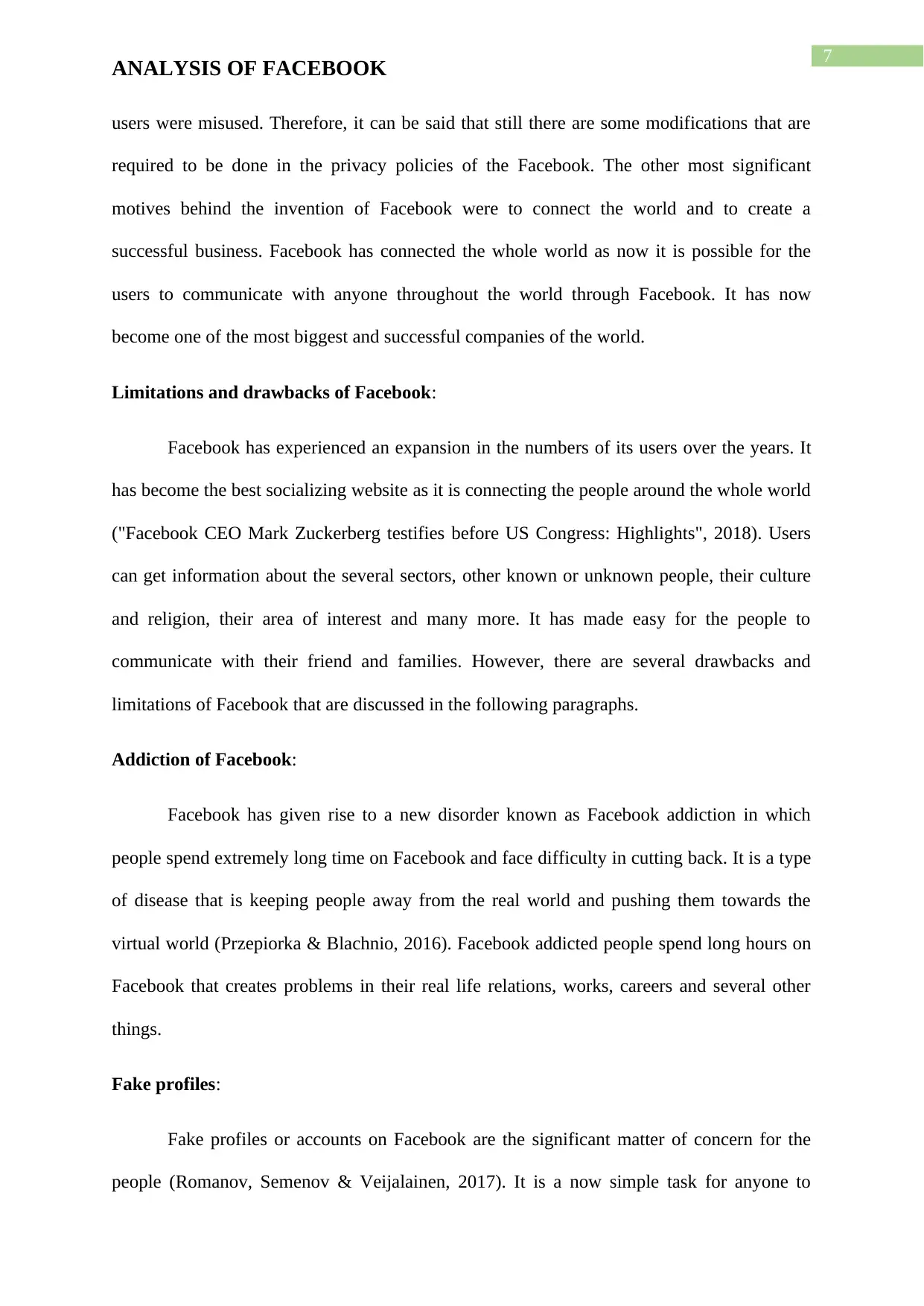
7
ANALYSIS OF FACEBOOK
users were misused. Therefore, it can be said that still there are some modifications that are
required to be done in the privacy policies of the Facebook. The other most significant
motives behind the invention of Facebook were to connect the world and to create a
successful business. Facebook has connected the whole world as now it is possible for the
users to communicate with anyone throughout the world through Facebook. It has now
become one of the most biggest and successful companies of the world.
Limitations and drawbacks of Facebook:
Facebook has experienced an expansion in the numbers of its users over the years. It
has become the best socializing website as it is connecting the people around the whole world
("Facebook CEO Mark Zuckerberg testifies before US Congress: Highlights", 2018). Users
can get information about the several sectors, other known or unknown people, their culture
and religion, their area of interest and many more. It has made easy for the people to
communicate with their friend and families. However, there are several drawbacks and
limitations of Facebook that are discussed in the following paragraphs.
Addiction of Facebook:
Facebook has given rise to a new disorder known as Facebook addiction in which
people spend extremely long time on Facebook and face difficulty in cutting back. It is a type
of disease that is keeping people away from the real world and pushing them towards the
virtual world (Przepiorka & Blachnio, 2016). Facebook addicted people spend long hours on
Facebook that creates problems in their real life relations, works, careers and several other
things.
Fake profiles:
Fake profiles or accounts on Facebook are the significant matter of concern for the
people (Romanov, Semenov & Veijalainen, 2017). It is a now simple task for anyone to
ANALYSIS OF FACEBOOK
users were misused. Therefore, it can be said that still there are some modifications that are
required to be done in the privacy policies of the Facebook. The other most significant
motives behind the invention of Facebook were to connect the world and to create a
successful business. Facebook has connected the whole world as now it is possible for the
users to communicate with anyone throughout the world through Facebook. It has now
become one of the most biggest and successful companies of the world.
Limitations and drawbacks of Facebook:
Facebook has experienced an expansion in the numbers of its users over the years. It
has become the best socializing website as it is connecting the people around the whole world
("Facebook CEO Mark Zuckerberg testifies before US Congress: Highlights", 2018). Users
can get information about the several sectors, other known or unknown people, their culture
and religion, their area of interest and many more. It has made easy for the people to
communicate with their friend and families. However, there are several drawbacks and
limitations of Facebook that are discussed in the following paragraphs.
Addiction of Facebook:
Facebook has given rise to a new disorder known as Facebook addiction in which
people spend extremely long time on Facebook and face difficulty in cutting back. It is a type
of disease that is keeping people away from the real world and pushing them towards the
virtual world (Przepiorka & Blachnio, 2016). Facebook addicted people spend long hours on
Facebook that creates problems in their real life relations, works, careers and several other
things.
Fake profiles:
Fake profiles or accounts on Facebook are the significant matter of concern for the
people (Romanov, Semenov & Veijalainen, 2017). It is a now simple task for anyone to
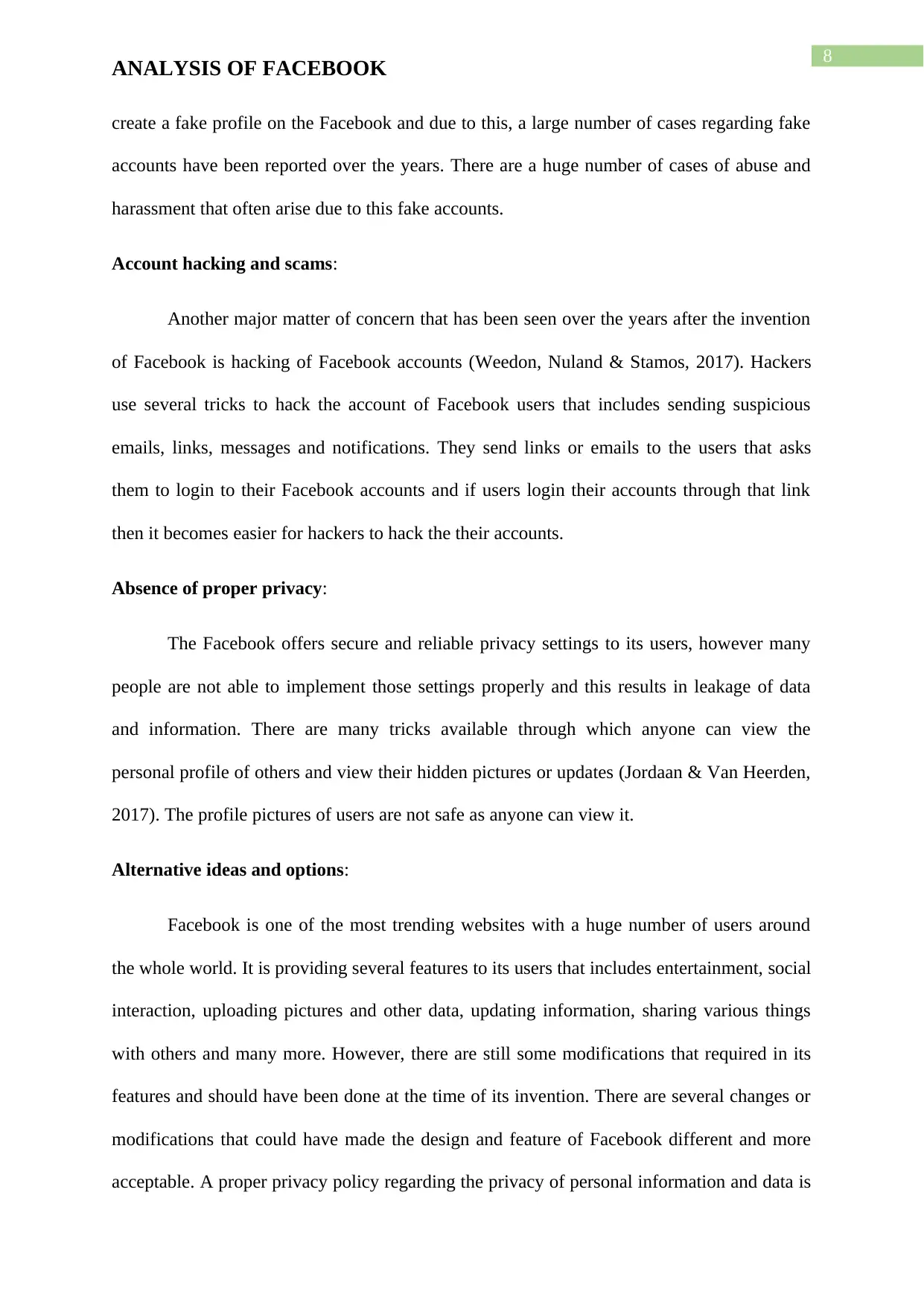
8
ANALYSIS OF FACEBOOK
create a fake profile on the Facebook and due to this, a large number of cases regarding fake
accounts have been reported over the years. There are a huge number of cases of abuse and
harassment that often arise due to this fake accounts.
Account hacking and scams:
Another major matter of concern that has been seen over the years after the invention
of Facebook is hacking of Facebook accounts (Weedon, Nuland & Stamos, 2017). Hackers
use several tricks to hack the account of Facebook users that includes sending suspicious
emails, links, messages and notifications. They send links or emails to the users that asks
them to login to their Facebook accounts and if users login their accounts through that link
then it becomes easier for hackers to hack the their accounts.
Absence of proper privacy:
The Facebook offers secure and reliable privacy settings to its users, however many
people are not able to implement those settings properly and this results in leakage of data
and information. There are many tricks available through which anyone can view the
personal profile of others and view their hidden pictures or updates (Jordaan & Van Heerden,
2017). The profile pictures of users are not safe as anyone can view it.
Alternative ideas and options:
Facebook is one of the most trending websites with a huge number of users around
the whole world. It is providing several features to its users that includes entertainment, social
interaction, uploading pictures and other data, updating information, sharing various things
with others and many more. However, there are still some modifications that required in its
features and should have been done at the time of its invention. There are several changes or
modifications that could have made the design and feature of Facebook different and more
acceptable. A proper privacy policy regarding the privacy of personal information and data is
ANALYSIS OF FACEBOOK
create a fake profile on the Facebook and due to this, a large number of cases regarding fake
accounts have been reported over the years. There are a huge number of cases of abuse and
harassment that often arise due to this fake accounts.
Account hacking and scams:
Another major matter of concern that has been seen over the years after the invention
of Facebook is hacking of Facebook accounts (Weedon, Nuland & Stamos, 2017). Hackers
use several tricks to hack the account of Facebook users that includes sending suspicious
emails, links, messages and notifications. They send links or emails to the users that asks
them to login to their Facebook accounts and if users login their accounts through that link
then it becomes easier for hackers to hack the their accounts.
Absence of proper privacy:
The Facebook offers secure and reliable privacy settings to its users, however many
people are not able to implement those settings properly and this results in leakage of data
and information. There are many tricks available through which anyone can view the
personal profile of others and view their hidden pictures or updates (Jordaan & Van Heerden,
2017). The profile pictures of users are not safe as anyone can view it.
Alternative ideas and options:
Facebook is one of the most trending websites with a huge number of users around
the whole world. It is providing several features to its users that includes entertainment, social
interaction, uploading pictures and other data, updating information, sharing various things
with others and many more. However, there are still some modifications that required in its
features and should have been done at the time of its invention. There are several changes or
modifications that could have made the design and feature of Facebook different and more
acceptable. A proper privacy policy regarding the privacy of personal information and data is
⊘ This is a preview!⊘
Do you want full access?
Subscribe today to unlock all pages.

Trusted by 1+ million students worldwide
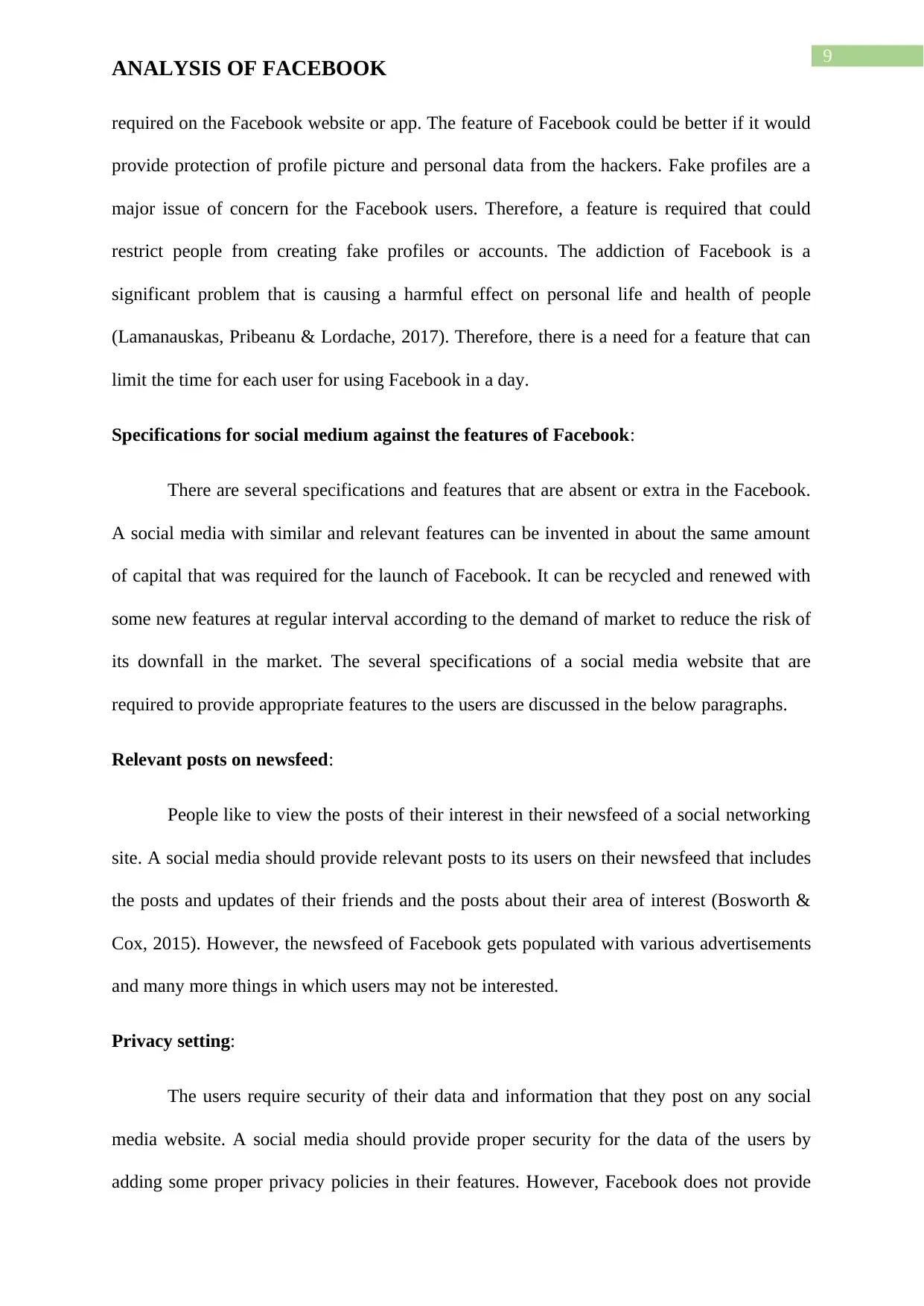
9
ANALYSIS OF FACEBOOK
required on the Facebook website or app. The feature of Facebook could be better if it would
provide protection of profile picture and personal data from the hackers. Fake profiles are a
major issue of concern for the Facebook users. Therefore, a feature is required that could
restrict people from creating fake profiles or accounts. The addiction of Facebook is a
significant problem that is causing a harmful effect on personal life and health of people
(Lamanauskas, Pribeanu & Lordache, 2017). Therefore, there is a need for a feature that can
limit the time for each user for using Facebook in a day.
Specifications for social medium against the features of Facebook:
There are several specifications and features that are absent or extra in the Facebook.
A social media with similar and relevant features can be invented in about the same amount
of capital that was required for the launch of Facebook. It can be recycled and renewed with
some new features at regular interval according to the demand of market to reduce the risk of
its downfall in the market. The several specifications of a social media website that are
required to provide appropriate features to the users are discussed in the below paragraphs.
Relevant posts on newsfeed:
People like to view the posts of their interest in their newsfeed of a social networking
site. A social media should provide relevant posts to its users on their newsfeed that includes
the posts and updates of their friends and the posts about their area of interest (Bosworth &
Cox, 2015). However, the newsfeed of Facebook gets populated with various advertisements
and many more things in which users may not be interested.
Privacy setting:
The users require security of their data and information that they post on any social
media website. A social media should provide proper security for the data of the users by
adding some proper privacy policies in their features. However, Facebook does not provide
ANALYSIS OF FACEBOOK
required on the Facebook website or app. The feature of Facebook could be better if it would
provide protection of profile picture and personal data from the hackers. Fake profiles are a
major issue of concern for the Facebook users. Therefore, a feature is required that could
restrict people from creating fake profiles or accounts. The addiction of Facebook is a
significant problem that is causing a harmful effect on personal life and health of people
(Lamanauskas, Pribeanu & Lordache, 2017). Therefore, there is a need for a feature that can
limit the time for each user for using Facebook in a day.
Specifications for social medium against the features of Facebook:
There are several specifications and features that are absent or extra in the Facebook.
A social media with similar and relevant features can be invented in about the same amount
of capital that was required for the launch of Facebook. It can be recycled and renewed with
some new features at regular interval according to the demand of market to reduce the risk of
its downfall in the market. The several specifications of a social media website that are
required to provide appropriate features to the users are discussed in the below paragraphs.
Relevant posts on newsfeed:
People like to view the posts of their interest in their newsfeed of a social networking
site. A social media should provide relevant posts to its users on their newsfeed that includes
the posts and updates of their friends and the posts about their area of interest (Bosworth &
Cox, 2015). However, the newsfeed of Facebook gets populated with various advertisements
and many more things in which users may not be interested.
Privacy setting:
The users require security of their data and information that they post on any social
media website. A social media should provide proper security for the data of the users by
adding some proper privacy policies in their features. However, Facebook does not provide
Paraphrase This Document
Need a fresh take? Get an instant paraphrase of this document with our AI Paraphraser
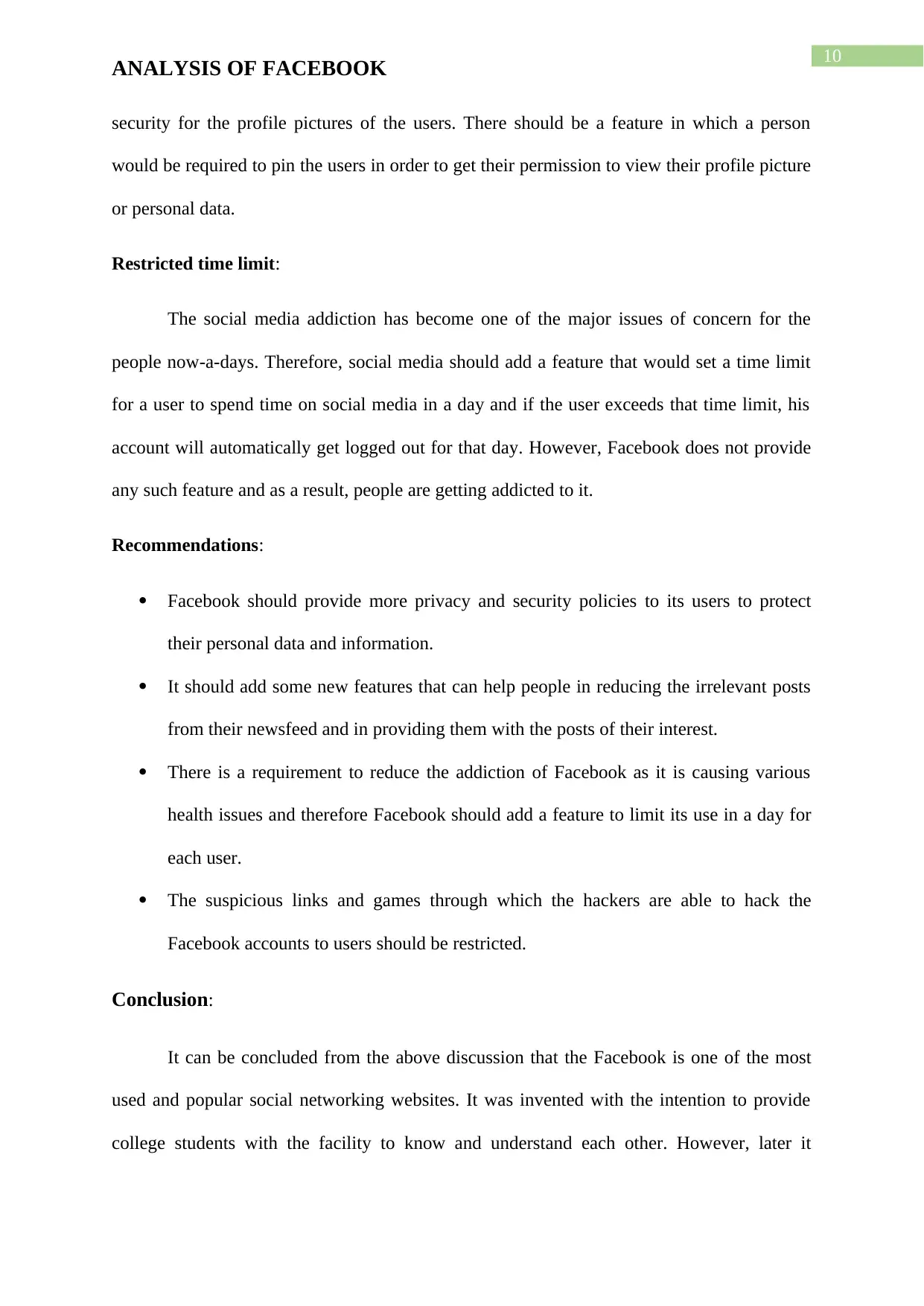
10
ANALYSIS OF FACEBOOK
security for the profile pictures of the users. There should be a feature in which a person
would be required to pin the users in order to get their permission to view their profile picture
or personal data.
Restricted time limit:
The social media addiction has become one of the major issues of concern for the
people now-a-days. Therefore, social media should add a feature that would set a time limit
for a user to spend time on social media in a day and if the user exceeds that time limit, his
account will automatically get logged out for that day. However, Facebook does not provide
any such feature and as a result, people are getting addicted to it.
Recommendations:
Facebook should provide more privacy and security policies to its users to protect
their personal data and information.
It should add some new features that can help people in reducing the irrelevant posts
from their newsfeed and in providing them with the posts of their interest.
There is a requirement to reduce the addiction of Facebook as it is causing various
health issues and therefore Facebook should add a feature to limit its use in a day for
each user.
The suspicious links and games through which the hackers are able to hack the
Facebook accounts to users should be restricted.
Conclusion:
It can be concluded from the above discussion that the Facebook is one of the most
used and popular social networking websites. It was invented with the intention to provide
college students with the facility to know and understand each other. However, later it
ANALYSIS OF FACEBOOK
security for the profile pictures of the users. There should be a feature in which a person
would be required to pin the users in order to get their permission to view their profile picture
or personal data.
Restricted time limit:
The social media addiction has become one of the major issues of concern for the
people now-a-days. Therefore, social media should add a feature that would set a time limit
for a user to spend time on social media in a day and if the user exceeds that time limit, his
account will automatically get logged out for that day. However, Facebook does not provide
any such feature and as a result, people are getting addicted to it.
Recommendations:
Facebook should provide more privacy and security policies to its users to protect
their personal data and information.
It should add some new features that can help people in reducing the irrelevant posts
from their newsfeed and in providing them with the posts of their interest.
There is a requirement to reduce the addiction of Facebook as it is causing various
health issues and therefore Facebook should add a feature to limit its use in a day for
each user.
The suspicious links and games through which the hackers are able to hack the
Facebook accounts to users should be restricted.
Conclusion:
It can be concluded from the above discussion that the Facebook is one of the most
used and popular social networking websites. It was invented with the intention to provide
college students with the facility to know and understand each other. However, later it
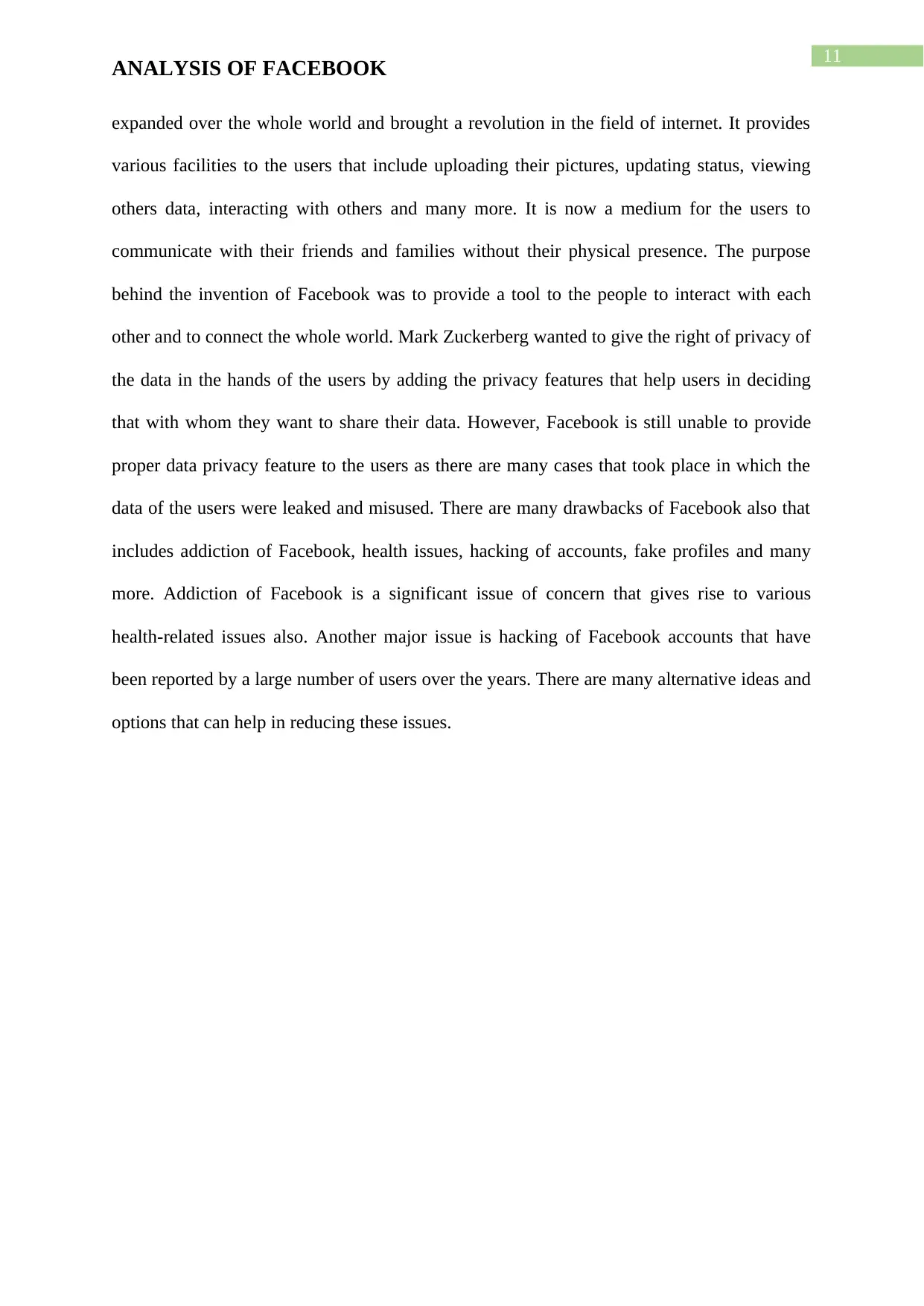
11
ANALYSIS OF FACEBOOK
expanded over the whole world and brought a revolution in the field of internet. It provides
various facilities to the users that include uploading their pictures, updating status, viewing
others data, interacting with others and many more. It is now a medium for the users to
communicate with their friends and families without their physical presence. The purpose
behind the invention of Facebook was to provide a tool to the people to interact with each
other and to connect the whole world. Mark Zuckerberg wanted to give the right of privacy of
the data in the hands of the users by adding the privacy features that help users in deciding
that with whom they want to share their data. However, Facebook is still unable to provide
proper data privacy feature to the users as there are many cases that took place in which the
data of the users were leaked and misused. There are many drawbacks of Facebook also that
includes addiction of Facebook, health issues, hacking of accounts, fake profiles and many
more. Addiction of Facebook is a significant issue of concern that gives rise to various
health-related issues also. Another major issue is hacking of Facebook accounts that have
been reported by a large number of users over the years. There are many alternative ideas and
options that can help in reducing these issues.
ANALYSIS OF FACEBOOK
expanded over the whole world and brought a revolution in the field of internet. It provides
various facilities to the users that include uploading their pictures, updating status, viewing
others data, interacting with others and many more. It is now a medium for the users to
communicate with their friends and families without their physical presence. The purpose
behind the invention of Facebook was to provide a tool to the people to interact with each
other and to connect the whole world. Mark Zuckerberg wanted to give the right of privacy of
the data in the hands of the users by adding the privacy features that help users in deciding
that with whom they want to share their data. However, Facebook is still unable to provide
proper data privacy feature to the users as there are many cases that took place in which the
data of the users were leaked and misused. There are many drawbacks of Facebook also that
includes addiction of Facebook, health issues, hacking of accounts, fake profiles and many
more. Addiction of Facebook is a significant issue of concern that gives rise to various
health-related issues also. Another major issue is hacking of Facebook accounts that have
been reported by a large number of users over the years. There are many alternative ideas and
options that can help in reducing these issues.
⊘ This is a preview!⊘
Do you want full access?
Subscribe today to unlock all pages.

Trusted by 1+ million students worldwide
1 out of 15
Your All-in-One AI-Powered Toolkit for Academic Success.
+13062052269
info@desklib.com
Available 24*7 on WhatsApp / Email
![[object Object]](/_next/static/media/star-bottom.7253800d.svg)
Unlock your academic potential
Copyright © 2020–2025 A2Z Services. All Rights Reserved. Developed and managed by ZUCOL.


